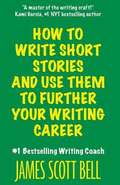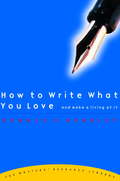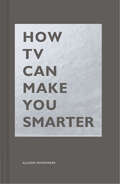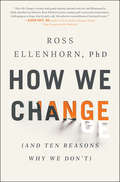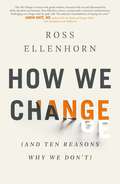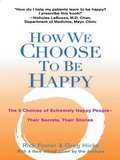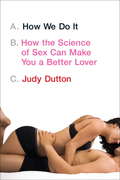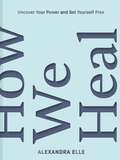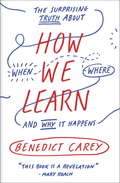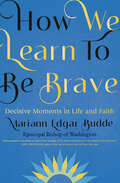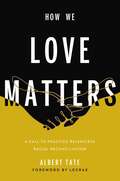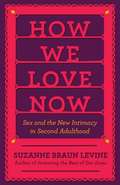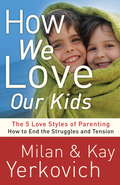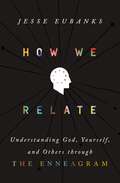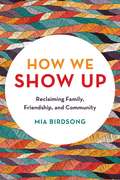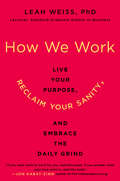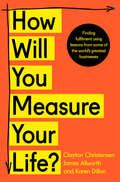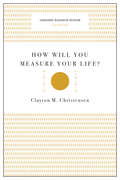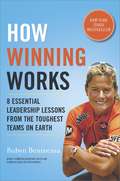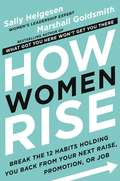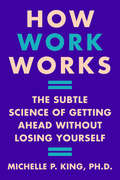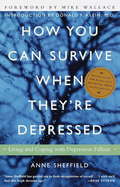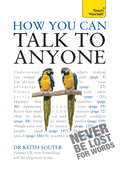- Table View
- List View
How to Write Short Stories and Use Them to Further Your Writing Career
by James Scott BellAs most writers will tell you, the hardest fiction form to master is the short story. To be successful, a short story needs to have "emotional wallop," and in under 7,000 words. Not easy to do. In this book, #1 bestselling writing teacher James Scott Bell explains the essential ingredient for a successful short story, no matter the genre. He shows how any writer—whether planner or "pantser"—can use this key to unlock infinite story possibilities. And turn readers into fans. Which is part of the strategy for short story writing today. With the coming of the digital revolution in publishing, short fiction presents possibilities beyond a one-time sale to a literary journal. Writers can use stories to increase discoverability, grow as a writer, generate some side income, and get back in touch with the sheer joy of writing. This book uses examples from the best stories by undisputed masters of the craft, including Ernest Hemingway, Raymond Carver, John Cheever, Stephen King and Irwin Shaw. In addition, five complete stories are included to show you the master key in action. Once you've been through this book, even once, you'll be well on your way to crafting short stories that readers love—which will build your fan base and boost your long-term writing career.
How to Write What You Love and Make a Living at It
by Dennis E. HensleyA writers’ writer shares his secrets The author of 49 books and over 3,000 articles, Dennis Hensley shares his secrets for making it as an author. He discusses how to find a distinctive style, how to make time to write, and how to negotiate contracts. In easy-to-follow steps, the book outlines the keys to contacting agents, securing copyrights, and selling manuscripts to more than one market. Lots of people want to make it as writers. Hensley tells you how to do it — and enjoy the process.
How TV Can Make You Smarter (The HOW Series)
by Allison ShoemakerHow TV Can Make You Smarter is a lively guide that shows readers the numerous emotional and intellectual benefits of TV. Contrary to conventional wisdom, television can do more than help you veg out, chill, and escape. Author and TV critic Allison Shoemaker rewires our thinking to show readers how to take advantage of our 24/7 access to this ever-evolving medium.• TV is a powerful tool and How TV Can Make You Smarter will teach you how to use it.• Covers a wide selection of diverse genres from scripted comedies, dramas, and classics to reality and beyond• Find acceptance in embracing "bad" TV, and learn to love yourself in the morning.Lessons include learning how to gain empathy (Mad Men), broadening your perspective (Rupaul's Drag Race), and discovering how working within boundaries (Doctor Who) or breaking them apart (Buffy the Vampire Slayer) can be good for you.Part of the HOW series, the accessible and authoritative guides to engaging with the arts the world, and ourselves.• Filled with smart, unintimidating content in a giftable foil-stamped package• Great for TV and movie buffs, Netflix and Hulu subscribers, DVD owners, and anyone who loves to unwind with television• Packed with insightful tips and tricks for making the most out of what you watch• You'll love this book if you love books like Amusing Ourselves to Death: Public Discourse in the Age of Show Business by Neil Postman, Everything Bad Is Good for You: How Today's Popular Culture Is Actually Making Us Smarter by Steven Johnson, and I Like to Watch: Arguing My Way Through the TV Revolution by Emily Nussbaum.
How We Change: (And Ten Reasons Why We Don't)
by Nathan AginThe Coronavirus pandemic has revealed a very big secret we’ve been keeping from ourselves and each other: We can be remarkably agile in the face of change. How is it that we are able to so radically and rapidly change our daily behavior in order to follow the social distancing and stay-at-home policies during the pandemic, and yet--pandemic or not--we typically find it difficult, if not impossible, to reach smaller personal goals like dieting, getting organized or changing destructive habits? The pandemic is life-threatening, so it ignites our survival instincts, activating that part of our brains charged with speedily and efficiently getting us to safety. But cholesterol, alcohol, and physical passivity are all life-threatening, and many of us humans have done a lousy job changing in regard to these issues, even when we have reliable information that they are killing us. Why do we struggle to change what would so obviously help ourselves individually? Ross Ellenhorn’s book, How we Change (and the Ten Reasons Why We Don’t) gives a fascinating answer. A clinician and thought leader in the mental health and addiction fields, he suggests that we’re often looking in the wrong direction when we try to decipher the factors that support human change. He suggests that it’s much more fruitful to look at why we don’t change, than figure out why we do. By looking at the reasons we don’t change, we give ourselves the best chance of actually changing in meaningful ways. Ellenhorn explains how we are wired to double down on the familiar because of what he calls the "Fear of Hope" - the act of protecting ourselves from further disappointment—and identifies the “10 Reasons Not to Change” to help us see why we behave the way we do when we are faced with the challenge of hope. Among them are: · To change means raising your expectations and thus risking that you’ll disappoint yourself.· Once you change, you are more accountable to make other changes than if you stayed the same· When you change, your future become much less predictable.· Change means destroying psychological monuments you’ve built to commemorate past injuries· Every time you change, you raise the possibility of losing or disrupting your relationship with certain peopleBy addressing this little known reality of fear of hope, and how it influences the 10 Reasons Not to Change, Ellenhorn actually gives us hope, helping us to work toward the change we seek. Ellenhorn speaks to the core of our insecurities and fears about ourselves, with a humor and kindness. By turning our judgments about self-destructive behaviors into curious questions about them, he teaches us to think about our actions to discover what we truly want - even if we’re going about getting it in the wrong way. How We Change is a brilliant approach that will forever alter our perspective - and help us achieve the transformation we truly seek.
How We Change (and 10 Reasons Why We Don't): (and Ten Reasons Why We Don't)
by Dr Ross EllenhornA paradigm-shifting, instant classic in the making that challenges our assumptions about change by encouraging us to understand and embrace our resistance to it.We all have something we want to change about ourselves. But whether it's quitting smoking, losing weight, or breaking some common bad habit or negative behaviour pattern, we feel a sense of failure when we don't succeed. This often sets off a cascade of negative feelings and discouragement, making it even harder to change. The voice in our head tells us: Why bother?Successful change depends far more on understanding why we don't change, psychotherapist and sociologist Ross Ellenhorn insists. His decades-long career as a pioneer in helping people overcome extreme psychiatric experiences and problematic substance use issues - especially those whom the behavioural healthcare system has failed - especially those whom the mental healthcare system has failed - has lead him to develop an effective, long-term method to achieve transformation, from the simplest shifts to the most profound. In How We Change, Ellenhorn looks to the evolutionary imperatives driving us. We are wired to double down on the familiar because of what he calls the Fear of Hope - the act of protecting ourselves from further disappointment. He identifies the '10 Reasons Not to Change' to help us see why we behave the way we do, making it clear that there is nothing broken inside us - it's how we're built. By addressing this little known reality, he gives us hope and helps us work toward the change we seek. Ellenhorn speaks to the core of our insecurities and fears about ourselves, with a humour and kindness. By turning our judgements about self-destructive behaviours into curious questions about them, he teaches us to think about our actions to discover what we truly want - even if we're going about getting it in the wrong way. How We Change is a brilliant approach that will forever alter our perspective and help us achieve the transformation we truly seek.
How We Choose to Be Happy
by Rick FosterWhat does it mean to be truly happy? Is there a secret to happiness?To most people it is self-evident--the secret to true happiness is not found in riches, things, or events. The source of happiness, as revealed in this insightful, inspiring, and infinitely practical book, is to be found in the way we choose to live our lives. Truly happy people make conscious decisions about how they will confront all of life's challenges. In the face of sometimes overwhelming circumstances, they create happiness by making the same nine internal, principle-centered choices. The people whose stories illuminate this book, representing a wide range of ages, and economic, social, political, and religious backgrounds, all make an active commitment to be happy. They are accountable for their own actions, thoughts, and feelings. They identify what makes them happy and make it central to their lives. Happy people find meaning and emotional energy in every event. They are flexible and open to life's many options. They appreciate what they have, and give unceasingly with no expectation of a "return. " Happy people are truthful with themselves and others. How We Choose to Be Happy explores the nine choices that extremely happy people make, and shows how anyone can follow these tenets to create a unique personal experience.
How We Do It: How the Science of Sex Can Make You a Better Lover
by Judy DuttonIn How We Do It, Judy Dutton explains everything that's going on chemically, neurologically, and biologically during a typical sexual encounter from first spark to climax-and reveals what really turns us on and how we can put that knowledge to use behind our closed bedroom doors. You'll learn the answers to perplexing questions like:
How We Heal: Uncover Your Power and Set Yourself Free
by Alexandra ElleBeloved wellness author and teacher Alexandra Elle shares this practical and empowering guide to self-healing. In How We Heal, bestselling author Alexandra Elle offers a life-changing invitation to heal yourself and reclaim your peace. In these pages, readers will discover essential techniques for self-healing, including journaling rituals to cultivate innate strength, accessible tools for processing difficult emotions, and restorative meditations to ease the mind. Alex Elle elegantly weaves together themes like self-healing, mindfulness, inner child work, and boundary setting and presents the reader with easy-to-follow practices that have changed her life and the lives of the thousands of people she has taught. Her 4-part framework for healing will appeal to anyone who wants a clear process, while the compelling personal stories leave the reader feeling connected and ready to begin again. Complementing the practices are powerful insights from Alex Elle's own journey of self-discovery using writing to heal, plus remarkable stories of healing from a range of luminary voices, including Nedra Tawwab, Morgan Harper Nichols, Dr. Thema Bryant, Barb Schmidt, and many more. Brimming with encouragement and delivered with Alex Elle's signature warmth and candor, How We Heal is a must-have companion for anyone that wants to unlock their inner wisdom and confidence to heal on their own.
How We Learn: The Surprising Truth About When, Where, and Why It Happens
by Benedict CareyIn the tradition of The Power of Habit and Thinking, Fast and Slow comes a practical, playful, and endlessly fascinating guide to what we really know about learning and memory today--and how we can apply it to our own lives. From an early age, it is drilled into our heads: Restlessness, distraction, and ignorance are the enemies of success. We're told that learning is all self-discipline, that we must confine ourselves to designated study areas, turn off the music, and maintain a strict ritual if we want to ace that test, memorize that presentation, or nail that piano recital. But what if almost everything we were told about learning is wrong? And what if there was a way to achieve more with less effort? In How We Learn, award-winning science reporter Benedict Carey sifts through decades of education research and landmark studies to uncover the truth about how our brains absorb and retain information. What he discovers is that, from the moment we are born, we are all learning quickly, efficiently, and automatically; but in our zeal to systematize the process we have ignored valuable, naturally enjoyable learning tools like forgetting, sleeping, and daydreaming. Is a dedicated desk in a quiet room really the best way to study? Can altering your routine improve your recall? Are there times when distraction is good? Is repetition necessary? Carey's search for answers to these questions yields a wealth of strategies that make learning more a part of our everyday lives--and less of a chore. By road testing many of the counterintuitive techniques described in this book, Carey shows how we can flex the neural muscles that make deep learning possible. Along the way he reveals why teachers should give final exams on the first day of class, why it's wise to interleave subjects and concepts when learning any new skill, and when it's smarter to stay up late prepping for that presentation than to rise early for one last cram session. And if this requires some suspension of disbelief, that's because the research defies what we've been told, throughout our lives, about how best to learn. The brain is not like a muscle, at least not in any straightforward sense. It is something else altogether, sensitive to mood, to timing, to circadian rhythms, as well as to location and environment. It doesn't take orders well, to put it mildly. If the brain is a learning machine, then it is an eccentric one. In How We Learn, Benedict Carey shows us how to exploit its quirks to our advantage.
How We Learn to Be Brave: Decisive Moments in Life and Faith
by Mariann Edgar BuddeAn inspirational guide to the key junctures in life that, if navigated with faith and discernment, pave the way for us to become our most courageous selves, by the bishop of the famed Episcopal Diocese of Washington, D.C.The decisive moments in life are those pivot points when we&’re called on to push past our fears and act with strength. With How We Learn to Be Brave, Bishop Mariann Budde teaches us to respond with clarity and grace even in the toughest times. Being brave is not a singular occurrence; it&’s a journey that we can choose to undertake every day. Here, Bishop Budde explores the full range of decisive moments, from the most visible and dramatic (the decision to go), to the internal and personal (the decision to stay), to brave choices made with an eye toward the future (the decision to start), those born of suffering (the decision to accept that which we did not choose), and those that come unexpectedly (the decision to step up to the plate). Drawing on examples ranging from Harry Potter to the Gospel According to Luke, she seamlessly weaves together personal experiences with stories from scripture, history, and pop culture to underscore both the universality of these moments and the particular call each one of us must heed when they arrive. With Bishop Budde&’s wisdom, readers will learn to live and to respond according to their true beliefs and in ways that align with their best selves. How We Learn to Be Brave will provide much-needed fortitude and insight to anyone searching for answers in uncertain times.
How We Love Matters: A Call to Practice Relentless Racial Reconciliation
by Albert TateThis powerful book reimagines discipleship by begging us to acknowledge that racism exists in the Church—and offers the hopeful message that we can disciple it out. It is not an accident that racism is alive and well in the American church. Racism has, in fact, been taught within the church for so long most of us don&’t even recognize it anymore. Pastor Albert Tate guides all of us in acknowledging the racism that keeps us from loving each other the way God intends and encourages siblings in Christ to sit together in racial discomfort, examining the role we may play in someone&’s else&’s struggle. How We Love Matters is a series of nine moving letters that educate, enlighten, and reimagine discipleship in a way that flips the church on its head. In these letters that include Dear Whiteness, Dear America, and Dear Church, Tate calls out racism in the world, the church, within himself and us. These letters present an anti-racist mission and vision for believers to follow that helps us to speak up at the family table and call out this evil so it will not persist in future generations. Tate believes that the only way to make change is by telling the truth about where we are—relationally, internally, and spiritually. How We Love Matters is an exposition of relevant Biblical truth, a clarion call for all believers to examine how they see and understand each other, and it is a way forward toward justice, reconciliation, and healing. Because, yes, it is important that we love each other, but it is even more important how we love each other.
How We Love Now
by Suzanne Braun LevineWhere do we find the relationships that matter in our second adulthood? Susanne Braun Levine, author of Inventing the Rest of Our Lives, anwers these questions with charming wit, experience, and intrigue in How We Love Now, with a new introduction by the author. Today, women in their fifties, sixties, and seventies are defining a totally new love narrative. Whether they are already experiencing intimacy-and great sex!-or longing to, these women are discovering unparalleled freedom and joy. Continuing Suzanne Braun Levine’s ongoing conversation with women in Second Adulthood, How We Love Now draws on her interviews with women across the country. Some are finding new relationships-with younger men, other women, or rediscovered childhood sweethearts-while others are enriching longstanding ones. (Of course, the Internet has opened up a new world of opportunities. ) Their funny, heart-wrenching, and inspiring stories prove that this pioneering generation of women is continuing to take risks-and enjoying life more than ever. .
How We Love Our Kids: The Five Love Styles of Parenting
by Kay Yerkovich Milan YerkovichOne Small Change in How You Love, One Big Change in your Kids. Having problems with your kids? What if you are the problem and you just can't see it? How We Love Our Kids offers a unique approach, to help you as a parent transform your kids by making specific changes in how you love. It's the only book specifically for parents that reveals the unseen forces that shape every interaction with your kids. Identify which of the five love styles you have. Discover the surprising dynamics that shape your parenting.Get rid of your "buttons" so your kids can't push them. Create a close connection with your kids that will last a lifetime. Learn the seven gifts every child needs. Based on years of research in the area of attachment and bonding, How We Love Our Kids shows parents how to overcome the predictable challenges that arise out of the five love styles and helps parents cultivate a secure, deep connection with a child of any age. Retool your reactions and refocus on how you love. Start today. Watch your kids flourish and thrive as they receive what was missing in your love. With four self-assessments and powerful application tools to use with children of all ages.
How We Relate: Understanding God, Yourself, and Others through the Enneagram
by Jesse EubanksAn Enneagram book like no other, How We Relate helps you discover how God speaks into your unique personality and life story to make the gospel come alive for you. In How We Relate, Enneagram coach and host of The EnneaCast podcast Jesse Eubanks invites you to discover who you are. In this illustrated guide, he expertly utilizes the Enneagram to lead you to the heart of Jesus, where you will find the wholeness you long for. As you peel back the layers of your False Self, encounter Jesus, and experience the redemption of your True Self, you will discover how to:Understand your personality and the personalities of othersExplore your distinct approach to relationshipsDiscover how Jesus empathizes with and heals your unique core woundInterpret the Enneagram through the gospel storyExperience more meaningful relationships with God, others, and yourself Life is about relationships. It's time to transform yours.
How We Show Up: Reclaiming Family, Friendship, and Community
by Mia BirdsongAn Invitation to Community and Models for ConnectionAfter almost every presentation activist and writer Mia Birdsong gives to executives, think tanks, and policy makers, one of those leaders quietly confesses how much they long for the profound community she describes. They have family, friends, and colleagues, yet they still feel like they're standing alone. They're "winning" at the American Dream, but they're lonely, disconnected, and unsatisfied.It seems counterintuitive that living the "good life"--the well-paying job, the nuclear family, the upward mobility--can make us feel isolated and unhappy. But in a divided America, where only a quarter of us know our neighbors and everyone is either a winner or a loser, we've forgotten the key element that helped us make progress in the first place: community. In this provocative, groundbreaking work, Mia Birdsong shows that what separates us isn't only the ever-present injustices built around race, class, gender, values, and beliefs, but also our denial of our interdependence and need for belonging. In response to the fear and discomfort we feel, we've built walls, and instead of leaning on each other, we find ourselves leaning on concrete.Through research, interviews, and stories of lived experience, How We Show Up returns us to our inherent connectedness where we find strength, safety, and support in vulnerability and generosity, in asking for help, and in being accountable. Showing up--literally and figuratively--points us toward the promise of our collective vitality and leads us to the liberated well-being we all want.
How We Work: Live Your Purpose, Reclaim Your Sanity, and Embrace the Daily Grind
by Leah WeissA practical guide to bringing our whole selves to our professional work, based on the author’s overwhelmingly popular course at the Stanford Graduate School of Business.In today’s workplace, the traditional boundaries between "work" and "personal" are neither realistic nor relevant. From millennials seeking employment in the sharing economy to Gen Xers telecommuting to Baby Boomers creating a meaningful second act, the line that separates who we are from the work we do is blurrier than ever.The truth is, we don’t show up for our jobs as a portion of ourselves—by necessity, we bring both our hearts and our minds to everything we do. In Take This Job And Love It, mindfulness expert and creator of the perennially-waitlisted Stanford Business School course "Leading with Mindfulness and Compassion" Dr. Leah Weiss explains why this false dichotomy can be destructive to both our mental health and our professional success.The bad news, says Weiss, is that nothing provides more opportunities for negative emotions—anxiety, anger, envy, fear, and paranoia, to name a few—than the dynamics of the workplace. But the good news is that these feelings matter. How we feel at and about work matters—to ourselves, to the quality of our work, and ultimately to the success of the organizations for which we work.The path to productivity and success, says Weiss, is not to change jobs, to compartmentalize our feelings, or to create a false "professional" identity—but rather to listen to the wisdom our feelings offer. Using mindfulness techniques, we can learn how to attend to difficult feelings without becoming subsumed by them; we can develop an awareness of our bigger picture goals that orients us and allows us to see purpose in even the most menial tasks. In Take This Job And Love It, Weiss offers a set of practical, evidence-based strategies for practicing mindfulness in the real world, showing readers not just how to survive another day, but how to use ancient wisdom traditions to sharpen their abilities, enhance their leadership and interpersonal skills, and improve their satisfaction.
How Will You Measure Your Life? (Harvard Business Review Classics)
by Clayton M. ChristensenIn the spring of 2010, Harvard Business School’s graduating class asked HBS professor Clay Christensen to address them-but not on how to apply his principles and thinking to their post-HBS careers. The students wanted to know how to apply his wisdom to their personal lives. He shared with them a set of guidelines that have helped him find meaning in his own life, which led to this now-classic article. Although Christensen’s thinking is rooted in his deep religious faith, these are strategies anyone can use.Since 1922, Harvard Business Review has been a leading source of breakthrough ideas in management practice. The Harvard Business Review Classics series now offers you the opportunity to make these seminal pieces a part of your permanent management library. Each highly readable volume contains a groundbreaking idea that continues to shape best practices and inspire countless managers around the world.
How Winning Works
by Robyn BenincasaRobyn Benincasa has made an art form of extreme performance by competing and winning at the highest levels of sport and business. In her fifteen-year career as a professional adventure racer, she has biked through jungles in Borneo, climbed Himalayan giants in Nepal, trekked across lava fields in Fiji, rafted rapids in Chile-and racked up multiple world championship titles along the way. In her spare time, she is a firefighter and a sought-after keynote speaker on the subject of teamwork and leadership.In How Winning Works, Benincasa shows you how to climb to new levels of professional and personal success. She shares the eight essential elements of teamwork, learned through her extreme adventure racing, that create synergy with all the teammates in your life, from colleagues and customers to family members and friends:Total Commitment Empathy and AwarenessAdversity ManagementMutual Respect"We" ThinkingOwnership of the ProjectRelinquishment of EgoKinetic LeadershipThis field guide to success shares the same training tools and exercises that have become wildly popular in the leadership seminars Benincasa gives to corporations, including Starbucks, Deloitte Consulting, 3M, Verizon, Nestlé, Boeing and many others. Stories from her adventure racing also illustrate how winning teams interact under the world's most extreme conditions, from jungles to mountain peaks.Whether you're trying to beat the competition to market with a new product, scale a looming mountain of deadlines or simply get your kids to clean up their rooms, the advice in this book will take you on an adventure you'll never forget, and coach you over the finish line to success.
How Women Rise: Break the 12 Habits Holding You Back from Your Next Raise, Promotion, or Job
by Marshall Goldsmith Sally HelgesenReady to take the next step in your career . . . but not sure what's holding you back? Read on. Leadership expert Sally Helgesen and bestselling leadership coach Marshall Goldsmith have trained thousands of high achievers--men and women--to reach even greater heights. Again and again, they see that women face specific and different roadblocks from men as they advance in the workplace. In fact, the very habits that helped women early in their careers can hinder them as they move up. Simply put, what got you here won't get you there . . . and you might not even realize your blind spots until it's too late. Are you great with the details? To rise, you need to do less and delegate more. Are you a team player? To advance, you need to take credit as easily as you share it. Are you a star networker? Leaders know a network is no good unless you know how to use it. Sally and Marshall identify the 12 habits that hold women back as they seek to advance, showing them why what worked for them in the past might actually be sabotaging their future success. Building on Marshall's classic best seller What Got You Here Won't Get You There, their new book How Women Rise is essential reading for any woman who is ready to advance to the next level.
How Work Works: The Subtle Science of Getting Ahead Without Losing Yourself
by Michelle P. KingA unique and revelatory guide to understanding and navigating the unwritten rules of the workplace—the key to achieving success, finding meaning, and staying true to your authentic self in today’s business world—from the organizational expert and celebrated author of The Fix.In her two decades researching organizations, Michelle King has discovered that people who succeed possess a particularly unique skill: They know how workplaces work. More specifically, to get ahead, they do not rely on the often generic and outdated written formal rules that for a century have defined the workplace. Instead, they have learned to gauge how they should behave and perform by becoming aware of informal (and unspoken) rules that exist just below the surface, rather than “formal” organizational guidelines. In this one-of-a-kind guide, King offers her proprietary framework based on over ten years of research and hundreds of employees who reached leadership positions. By focusing on five key areas -- navigating informal networks; developing self-awareness and awareness of others; learning the skills you need to be adaptive to changing conditions; getting support for your next promotion; and finding meaning and fulfillment at work—King teaches every professional how to understand and make these systems work for them and achieve their career ambitions.The new world of work requires a new way of working. With more people vying for top positions, a volatile unpredictable global workplace, and an ever-evolving landscape, it is increasingly important for employees to understand how to negotiate the unspoken and intangible elements of workplace culture.. In How Work Works, King dispels old myths and provides keen observations about what it means to find belonging, build networks, manage the informal and ultimately thrive at work.
How You Can Survive When They're Depressed
by Anne SheffieldEach year more than 17 million Americans suffer from a depressive illness, yet few suffer in solitude. How You Can Survive When They're Depressedexplores depression from the perspective of those who are closest to the sufferers of this prevalent disorder--spouses, parents, children, and lovers--and gives the successful coping strategies of many people who live with a clinical depressive or manic-depressive. Depression fallout is the emotional toil on the depressive's family and close friends who often are so focused on the welfare of the depressive, they are unaware of their own stressful reactions and needs. Sheffield outlines the five stages of depression fallout: confusion, self-doubt, demoralization, anger, and, finally, the desire to escape. Many people will find relief in the knowledge that their self-blame, guilt, sadness, and resentment are a natural result of living with a depressed person. Family and friends may even go through an unacknowledged period of mourning for the pre-depression person who has ceased temporarily to exist. These well-intentioned caregivers of depressives and manic-depressives suffer in painful silence, believing their own problems have no claim to attention. Sheffield brings together many real-life examples from the pioneering support group she attends at Beth Israel Hospital of how people with depression fallout have learned to cope. From setting boundaries to maintaining an outside social life, she gives practical tactics for handling the challenges and emotional stresses on a day-to-day basis. For example, a depressed spouse may make random threats of divorce and unfounded accusations of infidelity or deny the need for professional help. Sheffield counsels the depression fallout victim on how to deal with these and other typical behaviors, as well as providing invaluable information about both drug- and talk-therapy options and how to select the best practitioners for the depressive. No other book about depression focuses so clearly on the needs of the family and friends of a depressive and gives such a thorough program and sympathetic support to enable them to reclaim their lives and bring their depressive back to health. With an introduction from an expert physician, Donald F. Klein, professor of psychiatry at Columbia University, How You Can Survive When They're Depressed is the self-help book for depression fallout sufferers.
How You Can Survive When They're Depressed
by Anne Sheffield Mike WallaceEach year more than 17 million Americans suffer from a depressive illness, yet few suffer in solitude. How You Can Survive When They're Depressed explores depression from the perspective of those who are closest to the sufferers of this prevalent disorder--spouses, parents, children, and lovers--and gives the successful coping strategies of many people who live with a clinical depressive or manic-depressive and often suffer in silence, believing their own problems have no claim to attention.Depression fallout is the emotional toll on the depressive's family and close friends who are unaware of their own stressful reactions and needs. Sheffield outlines the five stages of depression fallout: confusion, self-doubt, demoralization, anger, and finally, the desire to escape. Many people will find relief in the knowledge that their self-blame, guilt, sadness, and resentment are a natural result of living with a depressed person. Sheffield brings together many real-life examples from the pioneering support group she attends at Beth Israel Medical Center of how people with depression fallout have learned to cope. From setting boundaries to maintaining an outside social life, she gives practical tactics for handling the challenges and emotional stresses on a day-to-day basis.
How You Can Survive When They're Depressed
by Mike Wallace Anne SheffieldEach year more than 17 million Americans suffer from a depressive illness, yet few suffer in solitude. How You Can Survive When They're Depressed explores depression from the perspective of those who are closest to the sufferers of this prevalent disorder--spouses, parents, children, and lovers--and gives the successful coping strategies of many people who live with a clinical depressive or manic-depressive and often suffer in silence, believing their own problems have no claim to attention.Depression fallout is the emotional toll on the depressive's family and close friends who are unaware of their own stressful reactions and needs. Sheffield outlines the five stages of depression fallout: confusion, self-doubt, demoralization, anger, and finally, the desire to escape. Many people will find relief in the knowledge that their self-blame, guilt, sadness, and resentment are a natural result of living with a depressed person. Sheffield brings together many real-life examples from the pioneering support group she attends at Beth Israel Medical Center of how people with depression fallout have learned to cope. From setting boundaries to maintaining an outside social life, she gives practical tactics for handling the challenges and emotional stresses on a day-to-day basis.
How You Can Talk To Anyone: Teach Yourself
by Keith Souter""How You Can Talk To Anyone"" will change the life of any reader who finds themselves scared and shy in social situations - and it will have a pretty amazing effect on those who just need a bit of a confidence boost!
